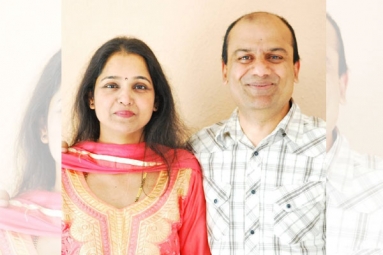
(Image source from: Canva.com)
Young, married, and apparently doing well, but is everything okay for health? As people earn more money, food delivery apps are increasing, and late-night snacks are getting fancier, young couples in urban India are noticing an unwanted side effect: they are putting on weight together. A recent study by the Indian Council of Medical Research (ICMR) shows that over 25% of young married couples in India are either overweight or obese. So what is actually happening? Is love making us less active? Or are couples simply enjoying food too much? The easy access to high-calorie meals through food apps is contributing to the problem. Most of these couples are urban, recently married, and eating well, but they are not moving around much. They tend to stay up late and keep eating until the late hours. Wealth and a lifestyle focused on pleasure is a recipe for gaining weight.
“Partners greatly affect each other's lives,” says Dr. Jain, “including what they eat, how they party, and their exercise habits. So when both partners adopt a similar inactive lifestyle, gaining weight is likely. Wealthy young couples, with less responsibility, often choose a fun lifestyle full of late-night outings, dining out, and binge-watching shows. On top of that, India’s diverse food culture, high-carb meals, desserts, red meat, and alcohol in certain places creates a significant issue. After marriage, there appears to be a major decrease in physical activity. Taking care of appearance is not a priority anymore. People begin to enjoy dining out more, work long hours, and focus on planning their finances. There’s also the effect on women. Obesity is linked to infertility and PCOD. So social and married life can suffer after getting married. Men often become more focused on their careers and neglect their health. Once you find your partner, the urge to look perfect diminishes. You feel free to order dessert. You might skip the gym because your partner loves you as you are. While it feels nice, it can be risky. Late-night biryani cravings and ice cream after arguments turn calories into a way of coping. If your partner reaches for snacks, you join in. If they miss morning workouts, you likely will too.
Arguments increase stress hormones that lead to cravings for sugary and carb-rich foods. Those post-fight ice creams? They are tied to emotions and biology. There are many modern influences: a dating culture where every special occasion is celebrated with heavy meals, bonding through screen time, and the promise of exercising together that often fades when one person quits. To maintain a healthy lifestyle, it’s important to work out together daily, have light dinners, and encourage each other rather than making jokes about weight.
After tying the knot, couples frequently enter a comfortable routine of pampering themselves. The goal of remaining fit can become less important. However, there is a silver lining: just like they can adopt unhealthy habits, couples can also choose to become healthier. When one partner starts focusing on their health—like scheduling regular doctor visits, increasing their walking, or cutting out sweets—the other often joins in. The most fit couples regard exercise as an aspect of their bond, rather than something separate. They prepare meals as a team. Work out alongside each other. They even check their weight together. And when disagreements arise?They resolve things through conversation instead of through food. This way, the best way to grow old together is by staying in shape so you can achieve your aspirations.











